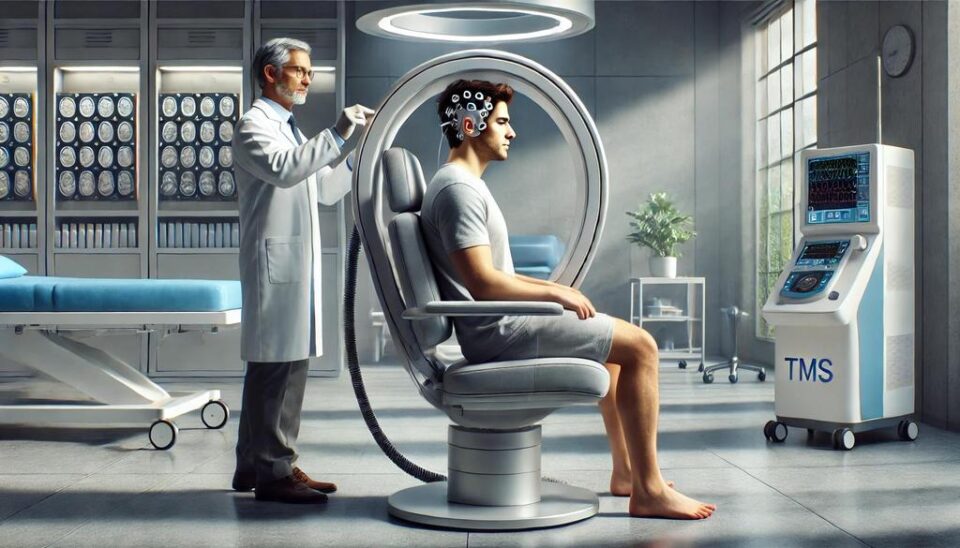Post-Traumatic Stress Disorder (PTSD) is a debilitating mental health condition that can severely affect the quality of life for individuals who have experienced or witnessed traumatic events. Individuals with PTSD often face recurring and intrusive memories of their trauma, flashbacks, nightmares, and heightened anxiety, all of which can significantly hinder their ability to function in daily life. While traditional treatments for PTSD, such as psychotherapy and medications, have their place, many individuals struggle to find lasting relief. Those searching for TMS treatment centers near me are discovering Transcranial Magnetic Stimulation (TMS) therapy as a promising option that offers hope.
Understanding PTSD and Its Challenges in Treatment
PTSD is a complex condition caused by the brain’s abnormal response to trauma, leading to heightened fear and emotional regulation issues. Symptoms include hyperarousal, avoidance, mood changes, and intrusive thoughts, which disrupt daily life, relationships, and work. Traditional therapies may only address certain aspects of PTSD, leaving others unaddressed. The emotional effects are long-lasting, and individuals often struggle to break free from the trauma cycle. Treatment is complicated by individual responses to therapy and medications, highlighting the need for personalized treatment options.
- PTSD is a complex mental health condition triggered by traumatic events.
- The condition can lead to hyperarousal, avoidance behaviors, and intrusive thoughts or memories.
- PTSD disrupts emotional regulation, causing heightened fear responses.
- Traditional therapies may only address some symptoms, leaving others unaddressed.
- Emotional and cognitive difficulties can impair relationships, productivity, and general well-being.
TMS Therapy: A Non-Invasive Solution
Transcranial Magnetic Stimulation (TMS) is a modern, non-invasive treatment that has shown promise in treating a variety of mental health conditions, including PTSD. It works by using magnetic pulses to stimulate specific areas of the brain that are involved in mood regulation and emotional processing. These pulses target the regions of the brain that are often underactive or dysfunctional in individuals with PTSD, helping to normalize their activity.
TMS has become a powerful tool for individuals who have not found relief with traditional PTSD treatments. The therapy is drug-free and offers a focused, direct approach to regulating brain activity, which helps reduce symptoms such as anxiety, intrusive thoughts, and emotional numbing. This makes TMS an appealing option for those who have experienced limited success with medication or psychotherapy.
How TMS Therapy Helps with PTSD
The brain regions affected by PTSD are responsible for regulating emotional responses and processing traumatic memories. When these regions become overactive or dysregulated, the person’s ability to cope with trauma is severely impaired. TMS helps by stimulating these regions with precisely targeted magnetic pulses, which in turn helps to reset the brain’s activity.
Unlike medications, which work by altering the chemical balance in the brain, TMS targets the neural pathways involved in emotional regulation. The therapy works directly to reestablish normal brain activity, which can alleviate symptoms of PTSD over time. This makes TMS an effective and safe alternative for those who have not responded well to medication-based approaches.
Who Can Benefit from TMS Therapy New Jersey?
While TMS is not a universal treatment for everyone with PTSD, it has proven to be highly effective for many individuals. People who have struggled with traditional therapies, such as talk therapy or medications, and have found minimal improvement may benefit from TMS therapy. It is also beneficial for individuals with complex PTSD, where multiple co-occurring conditions like depression and anxiety may complicate the treatment process.
TMS is often recommended for individuals who have exhausted other treatment options without significant success. Patients who have not found relief from antidepressants or psychotherapy may find that TMS offers the relief they have been searching for. Additionally, it can be used alongside other treatments for a more comprehensive approach to PTSD recovery.
What Makes TMS Unique for PTSD Treatment?
TMS is a non-invasive, drug-free treatment that targets specific brain areas to address PTSD symptoms more precisely than traditional therapies. It works by correcting the brain’s response to trauma, providing lasting relief for many patients. Unlike conventional treatments that can take months to show results, TMS offers quick improvements, with many patients noticing positive changes within just a few weeks, making it an appealing option for faster relief from PTSD symptoms.
- Non-invasive and drug-free, making it a safer alternative to medications with long-term side effects.
- Precision-targeted treatment that focuses on the exact brain regions involved in trauma processing.
- Quick results — many patients begin noticing improvements after just a few weeks of therapy.
The Benefits and Effectiveness of TMS Therapy
TMS has shown to be effective in treating PTSD symptoms such as flashbacks, hyperarousal, and emotional numbing. Many patients report improved mood, increased concentration, and reduced anxiety following TMS sessions. The therapy helps regulate the brain’s responses to trauma, allowing patients to regain control over their emotions and thoughts. As a result, many people experience a reduction in PTSD symptoms and an improved overall quality of life.
For those considering this treatment, understanding the transcranial magnetic stimulation pros and cons can provide valuable insight into what to expect and help in making an informed decision.
Furthermore, TMS has fewer side effects compared to traditional medications used to treat PTSD, making it a safer and more comfortable option for many individuals. Most patients report only mild discomfort during the procedure, such as a tapping sensation on the scalp, which subsides after the session ends.
Is TMS Therapy Safe for PTSD Patients?
TMS is considered a safe treatment option for PTSD, with a minimal side effect profile. Unlike medications, which can have long-term side effects or lead to dependency, TMS offers a non-invasive, drug-free alternative that does not pose significant risks. The FDA has approved TMS for the treatment of depression, including Depression Treatment and it is increasingly being recognized as an effective therapy for PTSD as well.
While rare, some individuals may experience mild discomfort, such as headaches or a slight increase in anxiety during the early stages of treatment. These symptoms typically subside after a few sessions, as the brain adjusts to the magnetic stimulation. It is important for patients to work closely with their medical providers to ensure that TMS is appropriate for their individual needs.
The Future of TMS in PTSD Treatment
As research into TMS therapy continues to evolve, its role in PTSD treatment is likely to expand. Ongoing studies are exploring its effectiveness in combination with other therapies such as Eye Movement Desensitization and Reprocessing (EMDR), which can enhance its effects. TMS has already shown promising results in helping patients with PTSD, and the growing body of evidence suggests that it may play an increasingly important role in trauma recovery.
For those struggling with PTSD in New Jersey, specialized TMS therapy clinics are available to provide personalized treatment plans aimed at reducing symptoms and improving overall quality of life. These clinics are offering a much-needed alternative to traditional PTSD treatments, helping individuals break free from the cycle of trauma and emotional distress.
Conclusion
TMS therapy presents a breakthrough in the treatment of PTSD, offering individuals a non-invasive, drug-free option to alleviate the symptoms of this debilitating condition. By directly targeting the brain’s neural pathways involved in emotional regulation and trauma processing, TMS for PTSD offers a focused and effective approach to PTSD recovery. For those who have not found relief from traditional treatments, TMS therapy provides hope for lasting improvement and a better quality of life. Additionally, How TMS Therapy Transforms the Treatment of Manic Episodes in Bipolar Disorder further highlights its versatility in addressing a range of mental health conditions, expanding its potential to improve overall well-being.
For individuals seeking relief from PTSD in New Jersey, TMS therapy offers a promising and accessible solution. As research and treatment options continue to advance, TMS may soon become a primary tool for those struggling with trauma and emotional distress, providing long-term relief for many.




